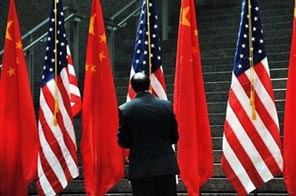Obama vows to get tougher on China trade
WASHINGTON: US President Barack Obama has vowed to get tougher with China on enforcing trade rules, stepping up the tone amid rising friction between the two powers over Taiwan and Tibet.
Obama also hinted he would take Beijing to task over the strength of its yuan currency, responding to growing restlessness in the US Congress over Chinese monetary policy as the US economy charts an uncertain recovery.
In a meeting with senators from his Democratic Party, Obama said he supported trade agreements with China but urged the developing power to open its markets further to US goods.
"The approach that we are taking is to try to get much tougher about enforcement of existing rules," Obama said.
He said what was needed was "putting constant pressure on China and other countries to open up their markets in reciprocal ways.
"One of the challenges we have got to address internationally is currency rates, and how they match up to make sure that our goods are not artificially inflated in price and their goods are artificially deflated in price."
Obama said that an "even playing field" would create US jobs. In his first State of the Union address to Congress last week, Obama set an ambitious -- some analysts say unrealistic -- goal of doubling US exports in five years.
"If we just increased our exports to Asia by a percentage point, by a fraction, it would mean hundreds of thousands, maybe millions of jobs here in the United States," Obama told the senators. "And it's easily doable."
Many policymakers in developed economies accuse China of keeping its yuan artificially low for the sake of its manufacturing industry, funding a flow of cheap exports around the world.
Senior American lawmakers from both major parties have accused Obama and his predecessor George W. Bush of letting China off easy by refusing to declare it a currency manipulator, which would trigger US counter-measures. Related article: No more Mr Nice Guy? Obama on China
"China is a big beneficiary of international trade, yet it fails to allow its currency to float freely," said Senator Chuck Grassley, the top Republican on the Finance Committee.
"That's not right for such a major economy, and American exporters are cheated as a result," he said.
China has argued that its peg to the dollar offers stability in a rapidly changing economy and has warned in turn against US protectionism. China also says it has contributed to a global economic recovery with a 585-billion-dollar stimulus package.
Obama pursued a conciliatory stance toward China in his first year, hoping to develop broad cooperation with the rising power and arguing that the two nations together would help shape the 21st century.
But the Obama administration last week approved a 6.4 billion-dollar arms package to Taiwan. China, which had warned against the sale, snapped military ties with the United States and threatened to blacklist US companies involved.
China considers Taiwan a territory awaiting reunification, by force if necessary. The United States does not recognize Taiwan, where China's defeated nationalists fled in 1949, but is bound by domestic law to provide the island arms for defensive purposes.
Another row is brewing as Tibet's spiritual leader the Dalai Lama prepares to visit Washington from February 17. The White House has said that Obama will meet him, despite China's appeals.
The Dalai Lama, who won the Nobel Peace Prize in 1989, is widely respected in the United States for his spiritual teachings. Related article: Dalai Lama not a 'separatist'
China accuses the Dalai Lama of separatism, although he says he accepts Chinese rule and is only seeking greater rights for Tibetans.
The United States and China are also at odds over Internet censorship, with Google last month threatening to pull out of the communist nation following attacks on human rights activists' email accounts.






